- Home
- Elizabeth Gilbert
The Signature of All Things
The Signature of All Things Read online
ALSO BY ELIZABETH GILBERT
Pilgrims
Stern Men
The Last American Man
Eat, Pray, Love: One Woman’s Search for Everything Across Italy, India and Indonesia
Committed: A Love Story
At Home on the Range, by Margaret Yardley Potter
VIKING
Published by the Penguin Group
Penguin Group (USA) LLC
375 Hudson Street
New York, New York 10014
USA | Canada | UK | Ireland | Australia | New Zealand | India | South Africa | China
penguin.com
A Penguin Random House Company
Copyright © 2013 by Elizabeth Gilbert
Penguin supports copyright. Copyright fuels creativity, encourages diverse voices, promotes free speech, and creates a vibrant culture. Thank you for buying an authorized edition of this book and for complying with copyright laws by not reproducing, scanning, or distributing any part of it in any form without permission. You are supporting writers and allowing Penguin to continue to publish books for every reader.
LIBRARY OF CONGRESS CATALOGING-IN-PUBLICATION DATA
Gilbert, Elizabeth, date
The signature of all things : a novel / Elizabeth Gilbert.
pages cm
ISBN 978-1-101-63800-2
1. Women botanists—Fiction. 2. Painters—Fiction. 3. Enlightenment—Fiction. 4. Industrial revolution—Fiction. I. Title.
PS3557.I3415S54 2013
813'.54—dc23 2013017045
Interior illustrations:
1: Cinchona calisaya
2: Dicranaceae
3: Aerides odoratum
4: Artocarpus incisa
5: Juglans laciniosa
The LuEsther T. Mertz Library of The New York Botanical Garden, Bronx, New York.
This is a work of fiction. Names, characters, places, and incidents either are the product of the author’s imagination or are used fictitiously, and any resemblance to actual persons, living or dead, businesses, companies, events, or locales is entirely coincidental.
For my grandmother
Maude Edna Morcomb Olson
in honor of her hundredth birthday
Contents
Also by Elizabeth Gilbert
Title Page
Copyright
Dedication
Epigraph
Prologue
PART ONE
The Tree of Fevers
PART TWO
The Plum of White Acre
PART THREE
The Disturbance of Messages
PART FOUR
The Consequence of Missions
PART FIVE
The Curator of Mosses
Acknowledgments
What life is, we know not. What life does, we know well.
—LORD PERCEVAL
Prologue
Alma Whittaker, born with the century, slid into our world on the fifth of January, 1800.
Swiftly—nearly immediately—opinions began to form around her.
Alma’s mother, upon viewing the infant for the first time, felt quite satisfied with the outcome. Beatrix Whittaker had suffered poor luck thus far generating an heir. Her first three attempts at conception had vanished in sad rivulets before they’d ever quickened. Her most recent attempt—a perfectly formed son—had come right to the brink of life, but had then changed his mind about it on the very morning he was meant to be born, and arrived already departed. After such losses, any child who survives is a satisfactory child.
Holding her robust infant, Beatrix murmured a prayer in her native Dutch. She prayed that her daughter would grow up to be healthy and sensible and intelligent, and would never form associations with overly powdered girls, or laugh at vulgar stories, or sit at gaming tables with careless men, or read French novels, or behave in a manner suited only to a savage Indian, or in any way whatsoever become the worst sort of discredit to a good family; namely, that she not grow up to be een onnozelaar, a simpleton. Thus concluded her blessing—or what constitutes a blessing, from so austere a woman as Beatrix Whittaker.
The midwife, a German-born local woman, was of the opinion that this had been a decent birth in a decent house, and thus Alma Whittaker was a decent baby. The bedroom had been warm, soup and beer had been freely offered, and the mother had been stalwart—just as one would expect from the Dutch. Moreover, the midwife knew that she would be paid, and paid handsomely. Any baby who brings money is an acceptable baby. Therefore, the midwife offered a blessing to Alma as well, although without excessive passion.
Hanneke de Groot, the head housekeeper of the estate, was less impressed. The baby was neither a boy nor was it pretty. It had a face like a bowl of porridge, and was pale as a painted floor. Like all children, it would bring work. Like all work, it would probably fall on her shoulders. But she blessed the child anyway, because the blessing of a new baby is a responsibility, and Hanneke de Groot always met her responsibilities. Hanneke paid off the midwife and changed the bedsheets. She was helped in her efforts, although not ably, by a young maid—a talkative country girl and recent addition to the household—who was more interested in looking at the baby than in tidying up the bedroom. The maid’s name does not bear recording here, because Hanneke de Groot would dismiss the girl as useless the next day, and send her off without references. Nonetheless, for that one night, the useless and doomed maid fussed over the new baby, and longed for a baby herself, and imparted a rather sweet and sincere blessing upon young Alma.
Dick Yancey—a tall, intimidating Yorkshireman, who worked for the gentleman of the house as the iron-handed enforcer of all his international trade concerns (and who happened to be residing at the estate that January, waiting for the Philadelphia ports to thaw so he could proceed on to the Dutch East Indies)—had few words to say about the new infant. To be fair, he was not much given to excessive conversation under any circumstances. When told that Mrs. Whittaker had given birth to a healthy baby girl, Mr. Yancey merely frowned and pronounced, with characteristic economy of speech, “Hard trade, living.” Was that a blessing? Difficult to say. Let us give him the benefit of the doubt and take it as one. Surely he did not intend it as a curse.
As for Alma’s father—Henry Whittaker, the gentleman of the estate—he was pleased with his child. Most pleased. He did not mind that the infant was not a boy, nor that it was not pretty. He did not bless Alma, but only because he was not the blessing type. (“God’s business is none of my business,” he frequently said.) Without reservation, though, Henry admired his child. Then again, he had made his child, and Henry Whittaker’s tendency in life was to admire without reservation everything he made.
To mark the occasion, Henry harvested a pineapple from his largest greenhouse and divided it in equal shares with everyone in the household. Outside it was snowing, a perfect Pennsylvania winter, but this man possessed several coal-fired greenhouses of his own design—structures that made him not only the envy of every plantsman and botanist in the Americas, but also blisteringly rich—and if he wanted a pineapple in January, by God he could have a pineapple in January. Cherries in March, as well.
He then retired to his study and opened up his ledger, where, as he did every night, he recorded all manner of estate transactions, both official and intimate. He began: “A new nobbel and entresting pasennger has joyned us,” and continued with the details, the timing, and the expenses of Alma Whittaker’s birth. His penmanship was shamefully crabbed. Each sentence was a crowded village of capital letters and small letters, living side by side in tight misery, crawling up on one another as though trying to escape the page. His spelling was several degrees beyond arbitrary, and his punctuat
ion brought reason to sigh with unhappiness.
But Henry wrote up his account, nonetheless. It was important for him to keep track of things. While he knew that these pages would look appalling to any educated man, he also knew that nobody would ever see his writing—except his wife. When Beatrix recovered her strength, she would transcribe his notes into her own ledgers, as she always did, and her elegantly penned translation of Henry’s scrawls would become the official household record. The partner of his days, was Beatrix—and a good value, at that. She would do this task for him, and a hundred other tasks besides.
God willing, she would be back at it shortly.
Paperwork was already piling up.
Cinchona calisaya, var. ledgeriana
PART ONE
The Tree of Fevers
Chapter One
For the first five years of her life, Alma Whittaker was indeed a mere passenger in the world—as we all are passengers in such early youth—and so her story was not yet noble, nor was it particularly interesting, beyond the fact that this homely toddler passed her days without illness or incident, surrounded by a degree of wealth nearly unknown in the America of that time, even within elegant Philadelphia. How her father came to be in possession of such great wealth is a story worth telling here, while we wait for the girl to grow up and catch our interest again. For it was no more common in 1800 than it has ever been for a poor-born and nearly illiterate man to become the richest inhabitant of his city, and so the means by which Henry Whittaker prospered are indeed interesting—although perhaps not noble, as he himself would have been the first to confess.
Henry Whittaker was born in 1760 in the village of Richmond, just up the Thames from London. He was the youngest son of poor parents who had a few too many children already. He was raised in two small rooms with a floor of beaten earth, with an almost adequate roof, with a meal on the hearth nearly every day, with a mother who did not drink and a father who did not beat his family—by comparison to many families of the day, in other words, a nearly genteel existence. His mother even had a private spot of dirt behind the house in which to grow larkspurs and lupines, decoratively, like a lady. But Henry was not fooled by larkspurs and lupines. He grew up sleeping one wall away from the pigs, and there was not a moment in his life when poverty did not humiliate him.
Perhaps Henry would have taken less offense at his destiny had he never seen wealth around him against which to compare his own poor circumstances—but the boy grew up witnessing not only wealth, but royalty. There was a palace at Richmond, and there were pleasure gardens there, too, called Kew, cultivated with expertise by Princess Augusta, who had brought with her from Germany a retinue of gardeners eager to make a false and regal landscape out of real and humble English meadows. Her son, the future King George III, spent his childhood summers there. When he became king, George sought to turn Kew into a botanical garden worthy of any Continental rival. The English, on their cold, wet, isolated island, were far behind the rest of Europe on botanizing, and George III was eager to catch up.
Henry’s father was an orchardman at Kew—a humble man, respected by his masters, as much as anyone could respect a humble orchardman. Mr. Whittaker had a gift for fruiting trees, and a reverence for them. (“They pay the land for its trouble,” he would say, “unlike all the others.”) He had once saved the king’s favorite apple tree by whip-grafting a scion of the ailing specimen onto sturdier rootstock and claying it secure. The tree had fruited off the new graft that very year, and soon produced bushels. For this miracle, Mr. Whittaker had been nicknamed “the Apple Magus” by the king himself.
The Apple Magus, for all his talents, was a simple man, with a timid wife, but they somehow turned out six rough and violent sons (including one boy called “the Terror of Richmond” and two others who would end up dead in tavern brawls). Henry, the youngest, was in some ways the roughest of them all, and perhaps needed to be, to survive his brothers. He was a stubborn and enduring little whippet, a thin and exploding contrivance, who could be trusted to receive his brothers’ beatings stoically, and whose fearlessness was frequently put to the test by others, who liked to dare him into taking risks. Even apart from his brothers, Henry was a dangerous experimentalist, a lighter of illicit fires, a roof-scampering taunter of housewives, a menace to smaller children; a boy who one would not have been surprised to learn had fallen from a church steeple or drowned in the Thames—though by sheer happenstance these scenarios never came to pass.
But unlike his brothers, Henry had a redeeming attribute. Two of them, to be exact: he was intelligent, and he was interested in trees. It would be exaggeration to claim that Henry revered trees, as his father did, but he was interested in trees because they were one of the few things in his impoverished world that could readily be learned, and experience had already instructed Henry that learning things gave a person advantage over other people. If one wanted to continue living (and Henry did) and if one wanted to ultimately prosper (and Henry did), then anything that could be learned, should be learned. Latin, penmanship, archery, riding, dancing—all of these were out of reach to Henry. But he had trees, and he had his father, the Apple Magus, who patiently took the trouble to teach him.
So Henry learned all about the grafter’s tools of clay and wax and knives, and about the tricks of budding, booting, clefting, planting, and pruning with a judicious hand. He learned how to transplant trees in the springtime, if the soil was retentive and dense, or how to do it in the autumn, if the soil was loose and dry. He learned how to stake and drape the apricots in order to save them from wind, how to cultivate citruses in the orangery, how to smoke the mildew off the gooseberries, how to amputate diseased limbs from the figs, and when not to bother. He learned how to strip the tattered bark from an old tree and take the thing right down to the ground, without sentimentality or remorse, in order to demand life back out of it for a dozen more seasons to come.
Henry learned much from his father, though he was ashamed of the man, who he felt was weak. If Mr. Whittaker truly was the Apple Magus, Henry reasoned, then why had the king’s admiration not been parlayed into wealth? Stupider men were rich—many of them. Why did the Whittakers still live with pigs, when just nearby were the great wide green lawns of the palace, and the pleasant houses on Maid of Honor Row, where the queen’s servants slept on French linens? Henry, climbing to the top of an elaborate garden wall one day, had spied a lady, dressed in an ivory gown, practicing manège on her immaculate white horse while a servant played the violin to entertain her. People were living like this, right there in Richmond, while the Whittakers did not even have a floor.
But Henry’s father never fought for anything fine. He’d earned the same paltry wage for thirty years, and had never once disputed it, nor had he ever complained about working outdoors in the foulest of weather for so long that his health had been ruined by it. Henry’s father had chosen the carefullest steps through life, particularly when interacting with his betters—and he regarded everyone as his better. Mr. Whittaker made a point never to offend, and never to take advantage, even when advantages may have been ripe for plucking. He told his son, “Henry, do not be bold. You can butcher the sheep only once. But if you are careful, you can shear the sheep every year.”
With a father so forceless and complacent, what could Henry expect to receive out of life, aside from whatever he could clutch at with his own hands? A man should profit, Henry started telling himself when he was only thirteen years old. A man should butcher a sheep every day.
But where to find the sheep?
That’s when Henry Whittaker started stealing.
* * *
By the mid-1770s, the gardens at Kew had become a botanical Noah’s Ark, with thousands of specimens already in the collection, and new consignments arriving weekly—hydrangeas from the Far East, magnolias from China, ferns from the West Indies. What’s more, Kew had a new and ambitious superintendent: Sir Joseph Banks, fresh from his triumphant voyage around the world as chief bo
tanist for Captain Cook’s HMS Endeavour. Banks, who worked without salary (he was interested only in the glory of the British Empire, he said, although others suggested he might be just the slightest bit interested in the glory of Sir Joseph Banks), was now collecting plants with furious passion, committed to creating a truly spectacular national garden.
Oh, Sir Joseph Banks! That beautiful, whoring, ambitious, competitive adventurer! The man was everything Henry’s father was not. By the age of twenty-three, a drenching inheritance of six thousand pounds a year had made Banks one of the richest men in England. Arguably, he was also the handsomest. Banks could easily have spent his life in idle luxury, but instead he sought to become the boldest of botanical explorers—a vocation he took up without sacrificing a bit of flash or glamour. Banks had paid for a good deal of Captain Cook’s first expedition out of his own pocket, which had afforded him the right to bring along on that cramped ship two black manservants, two white manservants, a spare botanist, a scientific secretary, two artists, a draftsman, and a pair of Italian greyhounds. During his adventure, Banks had seduced Tahitian queens, danced naked with savages on beaches, and watched young heathen girls having their buttocks tattooed in the moonlight. He had brought home with him to England a Tahitian man named Omai, to be kept as a pet, and he had also brought home nearly four thousand plant specimens—almost half of which the world of science had never before seen. Sir Joseph Banks was the most famous and dashing man in England, and Henry admired him enormously.
But he stole from him anyway.
It was merely that the opportunity was there, and that the opportunity was so obvious. Banks was known in scientific circles not merely as a great botanical collector, but also as a great botanical hoarder. Gentlemen of botany, in those polite days, generally shared their discoveries with each other freely, but Banks shared nothing. Professors, dignitaries, and collectors came to Kew from all over the world with the reasonable hope of obtaining seeds and cuttings, as well as samples from Banks’s vast herbarium—but Banks turned them all away.

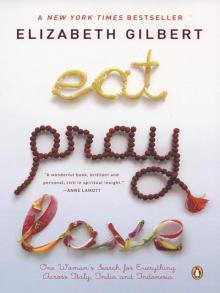 Eat, Pray, Love
Eat, Pray, Love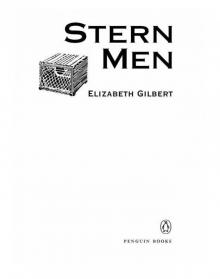 Stern Men
Stern Men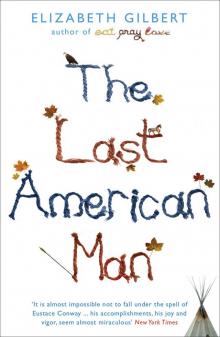 The Last American Man
The Last American Man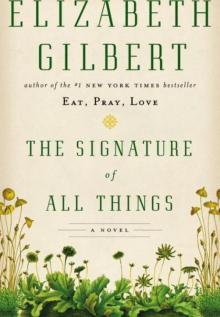 The Signature of All Things
The Signature of All Things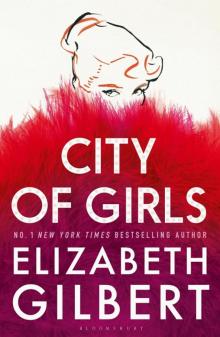 City of Girls
City of Girls Pilgrims
Pilgrims Committed: A Skeptic Makes Peace With Marriage
Committed: A Skeptic Makes Peace With Marriage Big Magic
Big Magic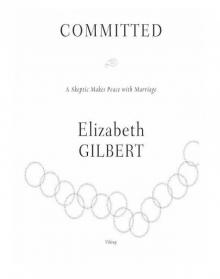 Committed
Committed The Best American Travel Writing 2013
The Best American Travel Writing 2013